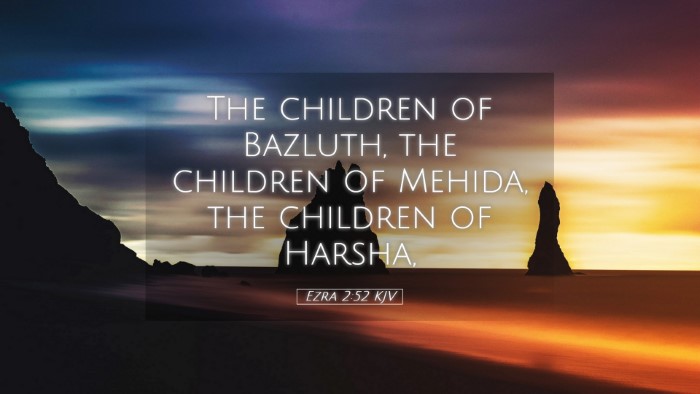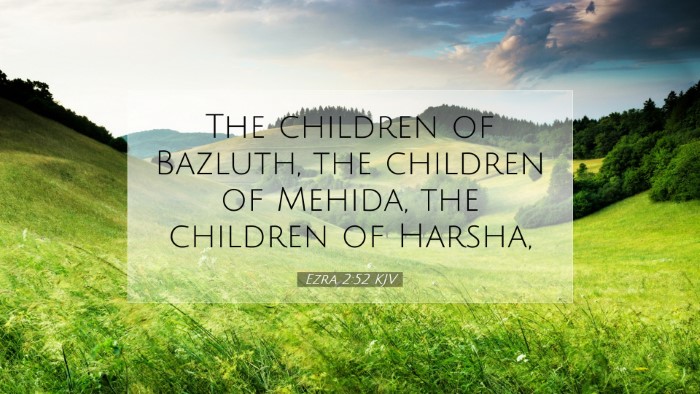Commentary on Ezra 2:52
Verse Summary: Ezra 2:52 lists the descendants of the servants of Solomon who returned from Babylon to Jerusalem. The mention of these individuals highlights the importance of their service and their role in the rebuilding of the Jewish community post-exile.
Contextual Overview
The Book of Ezra primarily addresses the return of the Jewish people from the Babylonian exile and the rebuilding of the temple. In this verse, the focus shifts to the specific families involved in the restoration. Understanding the significance of these descendants provides insight into the position of service within the community.
Analysis of the Text
In Ezra 2:52, we read, “The children of Solomon's servants: the children of Sotai, the children of Sophereth, the children of Peruda.” This enumeration not only serves as a historical record but also implies an ongoing legacy of service within the community.
Insights from Matthew Henry
Matthew Henry emphasizes the faithfulness of these servants, noting that they had a distinct role in the history of Israel. He points out that these descendants reflect the continuity of service and dedication, connecting the past glory of Solomon's reign to the present restoration efforts. Henry suggests that the mention of these descendants can remind us of the value of diligent service in God's work, despite the seeming obscurity of their roles.
Insights from Albert Barnes
Albert Barnes focuses on the historical aspect of the verse. He elucidates that the servants of Solomon likely held positions of labor in the temple and civil matters, indicating a structured society that had sustained itself even in exile. Barnes highlights that the mention of specific names may signify their remembrance in the records of God's people, which bears theological significance. By recording these names, the text affirms God's faithfulness across generations.
Insights from Adam Clarke
Adam Clarke provides a detailed etymology of the terms used to describe these servants. He comments on the Jewish tradition of preserving family lineages, which implies a divine order in maintaining the identity of God's people. Clarke suggests that the returnees, including Solomon's servants, were essential in both temporal and spiritual rebuilding and they played a crucial role in restoring worship practices that honor God.
Theological Reflections
This passage invites us to consider the following theological reflections:
- The Importance of Heritage: The mention of the descendants signifies the continuity of God's covenant and the importance of heritage in faith.
- Service in Community: It elucidates that every role matters in the work of God’s people, emphasizing that service—whether public or private—has eternal significance.
- God’s Faithfulness: The recounting of these names serves as a testament to the faithfulness of God, who remembers the faithful servants of the past.
- Restoration After Exile: It reflects the hope and restoration that comes after a period of struggle as the Jews returned to their homeland to rebuild what had been lost.
Application for Today’s Believers
For pastors, students, theologians, and Bible scholars, the insights from Ezra 2:52 challenge us to reflect on our own commitments to service within our communities. Questions to consider include:
- How do we acknowledge and honor the legacy of those who have served before us in our churches and communities?
- In what ways can we create environments that encourage service among current and future generations?
- How does understanding our place within the tradition of the Church enhance our faith and encourage us in our mission?
Conclusion
As we reflect on Ezra 2:52, we see a narrative that interweaves history, faithfulness, and the importance of every believer’s service. Both the writers of public domain commentaries and contemporary believers can find profound encouragement in this verse, as it underscores the continuity of God's work through generations and the call for all to participate in His mission.


